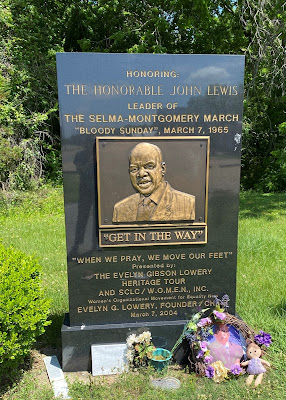May 17-21
On the banks of the Arkansas River, at the foot of the Edmund Pettus Bridge, is the Selma Memorial that commemorates "Bloody Sunday". In the scant teachings our country doles out about the civil rights struggle, you may have seen the shocking footage of that day. You may know less about the organization leading up to it, the reason for the march, and what happened afterwards.
As author Gay Talese points out in this video, most of the moments we see are "isolated examples of atrociousness. We told the world that this quarter of a mile is the story, and it has remained the story for over fifty years. . . but really, Selma hasn't changed that much. . ."
Talese is confirming my own experience that many of us have seen these few vignettes of outrageous racist violence against non-violent protestors, but we never get to see the whole picture. We usually have to look for it, which was my intent with this trip.
I was at the riverside memorial in Selma one afternoon, reading Charles Person's book Buses Are A-comin' when a woman walked past. Not many people were around--Selma is very quiet, most businesses were out of business or closed, so there wasn't much happening. For some reason I made eye contact--something I had generally avoided during this trip. I can't remember what we started talking about, but I must have a sixth sense about people from the Pacific Northwest because she was from Seattle also. Another solo traveler on the Civil Rights Trail, she was headed from Selma to Birmingham, and had just been to the Equal Justice Initiative in Montgomery.
We both expressed similar incredulities, which centered largely on our lack of civil rights education and our own search to face up to and eliminate racism. When we talked about seeing the lynching memorial in Montgomery, she said she had seen one portion where there were an overwhelming number of 'unknown' people who had all been lynched on the same day. That evening, she asked a friend about it. The two of them regularly talk race and rights. He did know about the lynching--it happened the day before an election. All of those 'unknown' people had been killed to stop them from voting.
Her friend said something like, "You have to search for your history", when she expressed frustration about the hiddenness of these facts. That's really the truth about American education: what you learn in K-12 is sanitized, politicized, and infantilized. A useful education teaches you how to search for and critique your own history, whatever that may be. Looking at everything that has roiled the U.S. over the last five years, it's an undertaking I hope some will engage in seriously. Even then, it's up for interpretation given who generally has the storytelling rights.




No comments:
Post a Comment
don't be a robot